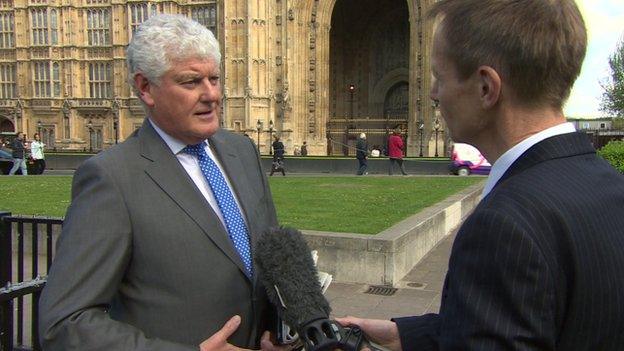Wales goes to the polls. Again.
- Published
- comments

'No, not at all' - Byron Davies, who will defend the smallest majority in the UK.
Byron Davies has found himself in demand today. His phone has not stopped ringing or buzzing with texts.
As the owner of the smallest majority in the UK - 27 votes - the Gower MP could be forgiven if he viewed Theresa May's announcement with trepidation.
Nervous? "No, not at all. Very confident, actually. I'm pleased that Theresa May has actually gone to the country. We have a situation where the Labour Party are in disarray. They're not sure whether to back Article 50. They're not sure now whether they want to agree to any agreement the prime minister comes to in Europe."
So the prime minister is calling an election because the opposition is in disarray? The consequences of that disarray - a 21-point opinion poll lead - might just have influenced the decision.
Mrs May's announcement caught everyone by surprise - the politicians, the pundits, even the bookmakers, two of whom have set up on Abingdon Green opposite the Houses of Parliament.
The leader of the Welsh Liberal Democrats, Mark Williams, spent most of Monday on a train from his constituency to Westminster. At the time of writing, he is still on that train.
Plaid Cymru leader Leanne Wood was speaking at a public meeting in Carmarthenshire when the news broke. Other MPs were travelling. Most were surprised.
'Referendum'
First Minister Carwyn Jones was away - the National Assembly is in recess. He did manage to tweet his reaction, describing the timing as "odd" and suggesting that Mrs May's focus on Europe would turn the election into a re-run of last year's referendum. That would be music to the ears of the Liberal Democrats, who will do their best to ensure it is exactly that.
Plaid Cymru said the timing was "cynical" but along with most Labour MPs will join the Conservatives in voting on Tuesday for an early poll.
Mrs May wants the election to be about "leadership" - Labour MPs may be less keen on that. Several have suggested they will be fighting on their "local record" (rather than, by implication, on Jeremy Corbyn's ability as a potential prime minister).
Aberavon Labour MP Stephen Kinnock chose to emphasise the local: "I'm not going to pretend that we're in a great place nationally," he said. "Twenty points behind is not where you'd want to start a campaign but the fact is that we have a group of fantastic Labour mps , we're going to go out into our constituencies and we're going to fight for every vote , we're going to remind people of what we can do as constituency MPs - fighting for what we need to see in Parliament."
The silver lining for Labour is that proposed boundary changes that would have hit the party disproportionately - and cut the number of Welsh MPs from 40 to 29 - will not happen. For now.
After the general election of 2015, the National Assembly elections of 2016, the Brexit referendum and May's council elections, voters in Wales will go to the polls in June for the fifth time in a little over two years. Will election fever or voter fatigue triumph in 2017?